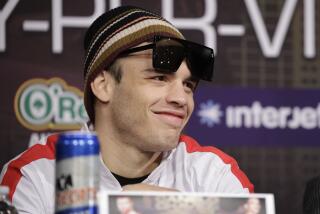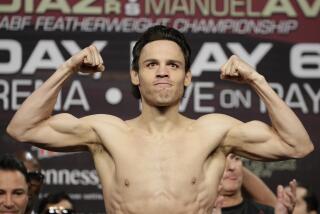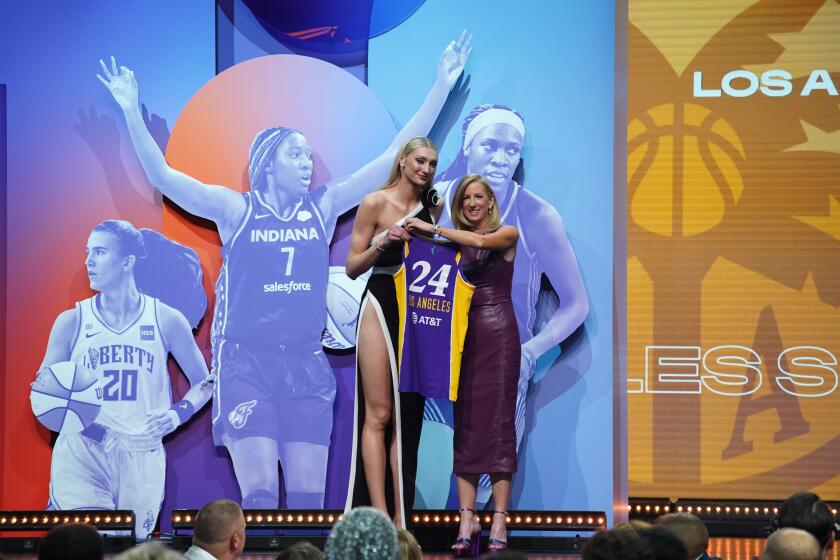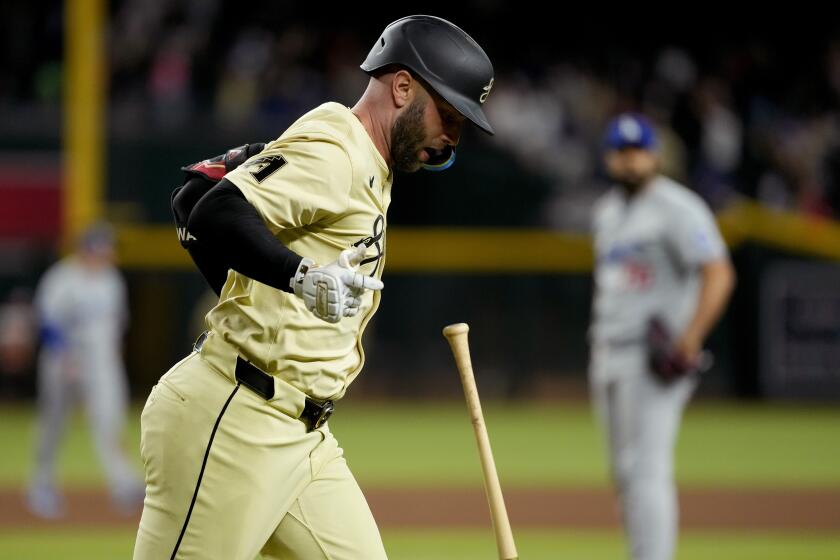Column: For Canelo Alvarez, Daniel Jacobs is the latest in a string of tough tests
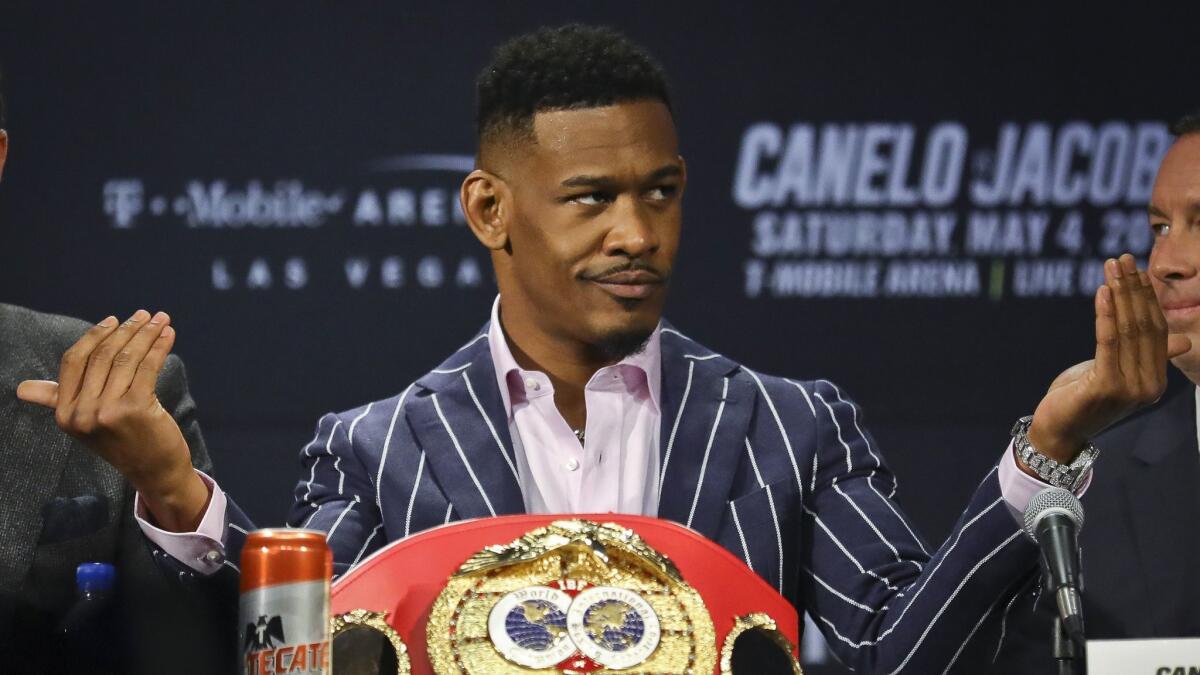
How and why fighters ended up in boxing rings often can be explained by the economic conditions into which they were born. This is not a sport for the affluent. So understand that when the word “privileged” is used here, it’s used in a relative sense.
In the world of boxing, Canelo Alvarez is privileged.
Before he signed a $365-million contract with streaming service DAZN, before his two career-defining showdowns against Gennady Golovkin, and even before he won his first world championship, Alvarez already was considered a silver spooner.
From the time he was a teenager, there were powerful interests determined to make him a superstar, in particular Mexican broadcasting giant Televisa and fighter-turned-promoter Oscar De La Hoya.
What distinguished Alvarez from most of boxing’s other so-called “chosen ones” is what he did with the advantages bestowed on him.
Alvarez could have used his earning power as an excuse to avoid the dangers inherent in his line of work. He could have exploited his celebrity to manufacture a legacy based on illusion.
Instead, the 28-year-old Alvarez has wielded his influence to invite risks, many of them considered unnecessary by the conventional wisdom that drives the sport.
Take his middleweight championship fight against Daniel Jacobs on Saturday at T-Mobile Arena in Las Vegas.
“I really respect Canelo,” Jacobs said in the lead-up. “He didn’t have to take this fight.”
Jacobs, 32, is a legitimate threat. Crafty and four inches taller than Alvarez, Jacobs once dropped a disputed decision to Golovkin, whom Alvarez narrowly defeated in September in the rematch of a draw from the previous year.
Jacobs is well respected within boxing circles, but is virtually anonymous outside the sport. He represents a high risk and low reward.
Taking a chance like this could threaten a lucrative third fight against Golovkin in September. But gambles like this also are what make fighters admired and Alvarez is determined to be admired, not only now, but also in posterity.
“I could have fought someone else,” Alvarez said in Spanish. “But what motivates me is to make history, to leave a legacy.”
Alvarez isn’t as versatile as Terence Crawford, as mesmerizing as Vasiliy Lomachenko or as fundamentally sound as Mikey Garcia.
While Alvarez might not be as gifted as any of his aforementioned contemporaries, he is more accomplished than any of them. The middleweight champion from Mexico has the best resume in boxing and it’s not even close.
He didn’t always look as if he was destined for this path.
The early stages of his career were like that of any other celebrated prospect, as he was carefully matched against a procession of opponents who were too small or too old to present actual threats.
His first world championship was a gift from the World Boxing Council, as he was allowed to claim a vacant 154-pound title in a victory over Matthew Hatton, the light-hitting and talent-deprived brother of former 140-pound champion Ricky Hatton.
Alvarez didn’t wrap himself in glory in the first handful of defenses of that championship, with his victims including former reality-show contestant Alfonso Gomez, a punch-drunk Shane Mosley and a criminally undersized Josesito Lopez.
Alvarez could have continued like this. He had the backing of television networks that wanted to capitalize on his striking facial features, red hair and light skin. He was paid handsomely.
About the only downside were the whispers that he might be a fraud.
Rather than remain on a safe course, Alvarez challenged another champion from the 154-pound division, southpaw Austin Trout. The elusive Trout’s style was all wrong for Alvarez and it showed over 12 rounds, Alvarez escaping with a close decision victory.
Sign up for our daily sports newsletter »
Alvarez was only 23 when he attempted to dethrone pound-for-pound champion Floyd Mayweather Jr. and was embarrassed in a lopsided decision loss. Within a year, Alvarez fought another sly, defensive-minded opponent in Cuban southpaw Erislandy Lara. Alvarez was awarded a controversial split-decision victory, which some observers interpreted as the latest sign of his privileged status within the sport.
At the same time, he had voluntarily faced an awkward fighter against whom no one has looked good; and he did so without significant incentive, as no title was at stake. His fights against Golovkin similarly yielded praise and produced criticism.
Alvarez was accused of delaying the confrontation so Golovkin would be further diminished by age. He was said by some to have been the beneficiary of favorable judging, as he was awarded a draw and a win in two fights that could have been scored for either fighter. And, between the two fights, he flunked a drug test.
None of this changed the reality that Alvarez was taking on a vicious puncher in Golovkin. The first contest provided evidence of Alvarez’s development, as the formerly plodding fighter appeared light on his feet as he attempted to outbox Golovkin.
To ensure the rematch also wouldn’t end in a draw, Alvarez became the aggressor in the second fight, forcing Golovkin to retreat.
Regardless of the accuracy of the official decisions — the opinion here was that Alvarez won the first fight and Golovkin the second — the two megafights were a testament to Alvarez’s improvement, adaptability and courage.
His fight with Jacobs will be another.
Follow Dylan Hernandez on Twitter @dylanohernandez
More to Read
Get our high school sports newsletter
Prep Rally is devoted to the SoCal high school sports experience, bringing you scores, stories and a behind-the-scenes look at what makes prep sports so popular.
You may occasionally receive promotional content from the Los Angeles Times.

